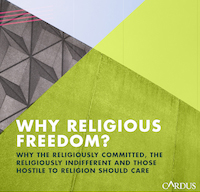Scharffs: Why the Religiously Committed, the Religiously Indifferent, and those Hostile to Religion Should Care

From the website of Cardus Law: This critical paper on religious freedom and its relationship to the State by Professor Brett Scharffs of the J. Reuben Clark Law School at Brigham Young University poses an important question: why should anyone care about religious freedom? The question here, though, is specifically directed towards those who are indifferent or hostile to, or uninformed about religious freedom.
Prof. Scharffs proceeds to examine a number of the crucial debates around freedom of religion and conscience through both an historical prism and by reviewing recent American jurisprudence dealing with this foundational, or as he terms it a “root” freedom. The arguments made by Prof. Scharffs are particularly cogent. Firstly, he articulates why religious freedom is a distinct freedom with deep historical and philosophical roots, distinct from freedom of speech, association, and assembly yet inextricably bound to them and they to it. He cautions against direct or indirect attempts to sever fundamental freedoms from the root of religious freedom—an act which would result in the withering of these related freedoms.
Secondly, in his examination of the role of the State vis-a-vis the guarantee of religious freedom he offers a valuable and timely distinction between what he terms monist and dualist views. Prof. Scharffs cautions against both secular and religious monism in which religious freedom and other freedoms are viewed as gifts of the State to citizens which can likewise be taken back by the State. He advocates for a dualism in which the State acknowledges the core principle that human rights are understood to be born by all human beings and derived from our inherent characteristics of reason and conscience and our ability to have empathy and compassion for our fellows. Prof. Scharffs raises grave concern about what he perceives to be “an erosion of the strong commitment to dualism that underlies not just the human rights worldview but most of Western history.”